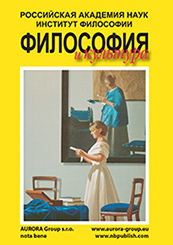Philosophical anthropology
Reference:
Rozin, V.M. (2025). The interpretation of culture as a cult and rational discourse. Philosophy and Culture, 5, 1–10. https://doi.org/10.7256/2454-0757.2025.5.73152
Abstract:
The article separates two interpretations of culture: as a cult and a rational structure; in the latter, the author, in turn, distinguishes between semiotic, psychological and social narratives. The characteristic of culture proposed by Mikhail Gefter is analyzed. Based on his ideas, the author argues that a person believes culture, and not only thinking rationally, but also in terms of faith. The dual interpretation of culture ‒ sacred and rational - was formed already in antiquity and continued to be reproduced in relation to different cultural conditions. Historical examples of this interpretation are considered: in archaic culture, in the Middle Ages in the "Confessions" of St. Augustine, in the Renaissance by Nicholas of Cusa. New European culture (sociologists often say modern), according to the author, is the last variant of two versions of culture. As the culture of modernity comes to an end, undergoing a deep crisis, the ideas about nature, personality and sociality underlying the cult of modernity cease to be perceived as a sacred foundation, and rational constructions cease to work effectively. At the end of the article, the ideas of cosmic reality are discussed, as well as stories put forward for the role of a new cult of the next big culture ("future culture"). There are other contenders for the role of a cult for the future culture (world religions, Humanity, Reason, artificial intelligence, dictatorship, etc.), but all of them are not yet accepted by the main participants in the modern discourse of "Salvation". The author, comparing different historical versions of "Salvation", raises the question of whether humanity has enough time to solve the modern problems of our time.
Keywords:
realization, project, future, the past, rational concepts, The cult, history, culture, versions, reconstruction
 This work is licensed under a Creative Commons Attribution-NonCommercial 4.0 International License.
This work is licensed under a Creative Commons Attribution-NonCommercial 4.0 International License.










 © 1998 – 2025 Nota Bene. Publishing Technologies. NB-Media Ltd.
© 1998 – 2025 Nota Bene. Publishing Technologies. NB-Media Ltd.




